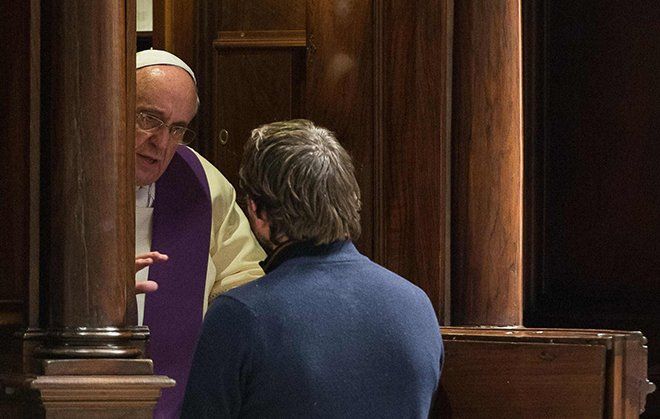Reconciliation

Reconciliation Times
Monday - Friday: from 5:30pm-6pm
Those who approach the sacrament of Penance obtain pardon from God's mercy for the offense committed against him, and are, at the same time, reconciled with the Church which they have wounded by their sins and which by charity, by example, and by prayer labors for their conversion. CCC 1422
Scriptural basis: “Receive the Holy Spirit. Whose sins you forgive are forgiven them, and whose sins you retain are retained” (Jn 20:22-23; see also Mt 18:18).
Who can receive the sacrament?
Jesus knew well that many of us would forget our brave baptismal promises and commit grave sins after our Baptism. He knew that many of us would lose the grace, the sharing-in-God's-own-life which came to us in Baptism. Since God's mercy is infinite and unwearying, it seems inevitable that he would provide a second chance (and a third and a fourth and a hundredth if necessary) for those who might relapse into sin.
Who can administer the sacrament?
Bishops and priests, are the ministers of reconciliation.
How is it celebrated?
The forgiveness of sins involves four parts:
Contrition: a sincere sorrow for having offended God, and the most important act of the penitent. There can be no forgiveness of sin if we do not have sorrow and a firm resolve not to repeat our sin.
Confession: confronting our sins in a profound way by speaking about them- aloud- to God through the priest.
Penance: an important part of our healing is the “penance” we perform in reparation for our sins.
Absolution: the priest, by virtue of his ordination, speaks the words by which “God, the Father of Mercies” reconciles a sinner to Himself through the merits of the Cross.
The Sacrament may be celebrated face-to-face or anonymously, with a screen between you and the priest.
1. The penitent (you) and the priest begin with the sign of the Cross, saying:
“In the Name of the Father and of the Son and of the Holy Spirit.”
2. The priest urges the penitent to have confidence in God with these or similar words:
“May the Lord be in your heart and help you to confess your sins with the true sorrow.”
3. The priest may read or say a passage from Sacred Scripture after which the penitent then states:
“Forgive me, Father, for I have sinned. It has been [tell him however many days, weeks, months or years] since my last confession.”
4. The penitent then states his or her sins. For the confession to be valid, the penitent must confess all of the mortal sins he or she is aware of having committed since the last confession, be sorry for them, and have a firm purpose of amendment to try not to commit the same sins in the future.
5. After this, the priest will general give some advice to the penitent and impose a penance.
6. Then he will ask the penitent to make an act of contrition.
What are the sacrament’s effects?
"The whole power of the sacrament of Penance consists in restoring us to God's grace and joining us with him in an intimate friendship."73 Reconciliation with God is thus the purpose and effect of this sacrament. For those who receive the sacrament of Penance with contrite heart and religious disposition, reconciliation "is usually followed by peace and serenity of conscience with strong spiritual consolation."74 Indeed the sacrament of Reconciliation with God brings about a true "spiritual resurrection," restoration of the dignity and blessings of the life of the children of God, of which the most precious is friendship with God.75
1469 This sacrament reconciles us with the Church. Sin damages or even breaks fraternal communion. the sacrament of Penance repairs or restores it. In this sense it does not simply heal the one restored to ecclesial communion, but has also a revitalizing effect on the life of the Church which suffered from the sin of one of her members.76 Re-established or strengthened in the communion of saints, the sinner is made stronger by the exchange of spiritual goods among all the living members of the Body of Christ, whether still on pilgrimage or already in the heavenly homeland:77
It must be recalled that . . . this reconciliation with God leads, as it were, to other reconciliations, which repair the other breaches caused by sin. the forgiven penitent is reconciled with himself in his inmost being, where he regains his innermost truth. He is reconciled with his brethren whom he has in some way offended and wounded. He is reconciled with the Church. He is reconciled with all creation.78
In this sacrament, the sinner, placing himself before the merciful judgment of God, anticipates in a certain way the judgment to which he will be subjected at the end of his earthly life. For it is now, in this life, that we are offered the choice between life and death, and it is only by the road of conversion that we can enter the Kingdom, from which one is excluded by grave sin.79 In converting to Christ through penance and faith, the sinner passes from death to life and "does not come into judgment. CCC 1468-1470



